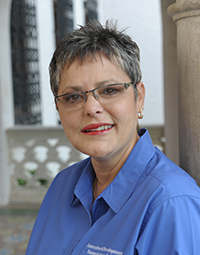• by Rosana G. Rodríguez, Ph.D., and Nilka Avilés, Ed.D. • IDRA Newsletter • May 2014 •



Making college readiness a reality for all students is a challenge for our high schools. The challenge involves changing hearts and expectations and establishing a system for personalizing instruction, an understanding of college readiness skills, a commitment to all students, and a system to monitor progress. Impressive improvements in academic performance of students result when we focus on developing cognitive and affective competencies needed to excel in school and college.
Students acquire requisite knowledge and skills and boost their abilities aligned with college expectations when they prepare for college through rigorous, high quality education programs that incorporate genuine social, emotional, developmental and academic support systems by caring adults. One has to be intentional in understanding what constitutes rigor, high expectations and college readiness in order to develop a frame of reference that guides teachers into action for the intended outcomes pertaining to curriculum and instruction.
The affective domain also must be cultivated to enhance teaching and learning. Teachers can build positive relationships and promote a supportive community among students where they help each other succeed in school. How can we accomplish this? Some schools have effectively incorporated the following practices resulting in successful outcomes.
- Facilitating peer support.
- Offering transitional bridge classes.
- Ensuring active involvement of caring adults.
- Fostering open communication and discussion by groups of students talking about their beliefs.
- Supporting students’ values and cultures.
- Empowering students to take risks in a safe environment.
- Providing incentives for improvement and high achievement.
- Encouraging families as part of a circle of support for students.
- Providing opportunities for community service where students can demonstrate leadership skills.
- Mentoring provided by positive role models.
It is important to demystify access to higher education and inspire strong cognitive and meta-cognitive skills, such as self-determination, persistence, resilience and self-discipline, that support success in college. It is our obligation to ensure that all students are prepared to succeed in college. College readiness requires competency in both the cognitive and affective domains. Both are necessary to ensure more students, particularly those most underserved and underrepresented, not only enter college prepared but persist to complete their degree of choice.
To accomplish this, we can reflect on supportive practices and policies that create meaningful and sustainable change. Developing a system of college readiness indicators along with genuine supports and interventions through community-wide advocacy, collaboration and partnerships with post-secondary institutions is effective in fostering the knowledge and tenacity students need to accomplish their dreams.
As schools strive to create a culture of engagement and high expectations for graduation and college readiness, we must continually advocate for policies and practices that ensure equity, access and success for all students. However, amidst all the structural inequities and systemic reforms that certainly need addressing and are long overdue, teachers’ perceptions and their relationships with each of their students remains paramount. This type of internal change is deep and requires that educators connect with their students as they live out their vocation each day in every classroom. Seasoned and new teachers alike are challenged to recognize their role as leaders of change in their schools, with the noble responsibility of helping form the next generation of citizens who will shape this nation.
Inspiring and preparing students for college requires razor-sharp skills in content areas and a willingness to reach out and connect with students to ignite their passion in learning and belief that they can succeed. What does it mean to be a teacher in today’s world? It means in a special way to never forget the student who is marginalized or who typically falls through the cracks of the system. In such a data-driven reality where student scores are paramount, it means taking time for the weakest or struggling students who are often viewed as the least important.
At IDRA we believe that all students are valuable, none is expendable. While technology and resources grow for some, inequities tragically continue to exist that affect the most unequal parts of our communities, perpetuating the cycle of under resourced schools, low expectations and poorly trained teachers for students of greatest need. This situation surely cries out for justice and structural changes and demands even greater commitment and expertise from teachers serving in these classrooms.
One is inspired by teachers in whose classrooms you immediately sense the living vocation of a true educator iin action. What are some qualities that are so recognizable and palpable in those classrooms where high expectations and high support value and encourage each student toward graduation and college and career readiness? Those teachers exemplify a student-centered approach and willingness to really listen to what their students are saying, feeling and experiencing. They display a capacity to stay close to their students and hear what their needs are.
A sense of humor and humility are evident in those classrooms. Students seek role models to emulate and teachers who have an easy style, who are approachable and who display a sense of humor and humility. These are irresistible to students, drawing them in for meaningful learning experiences, encouraging and offering advice on how to stay on track for graduation and college. It may be risky for teachers to engage in this manner, but it is worth the risk to reach students who are shy or need special encouragement. This approachability allows students to feel close to their teacher, as a confidant and advocate who believes they can succeed. Barriers to learning come down when teachers connect to their students and their inevitable frustrations and doubts about graduation and college.
Teachers and classrooms that remain isolated close in on themselves, become stale for students, uninspiring and old. If teachers are not reaching out to their students, there is no continuity. They risk moving backwards, becoming irrelevant or losing their students altogether. Teachers need to help students continuously see education as an unfolding journey of self-discovery. They must inspire their students to succeed despite setbacks that occur.
High expectations are the fruits of hopefulness. A teacher who believes his or her students will succeed inspires courage and persistence necessary for the journey through graduation, college and work.
What are the teachers around you passing on to young people? Is it a sense of hopefulness in their ability to succeed, coupled with the requisite skills and support to demystify the college process? When they get older, who will our students remember as teachers who inspired them the most to succeed, despite any odds? They will remember those who genuinely valued them, made time to get to know them, and believed in their brilliance. All students have gifts. It is up to us to discover and foster those gifts for graduation and beyond.
Resources
Avilés, N. “Building College Readiness for All Students,” IDRA Newsletter (San Antonio, Texas: Intercultural Development Research Association, October 2013).
Conley, D.T. College and Career Ready- Helping All Students Succeed Beyond High School (San Francisco, Calif.: Jossey-Bass, 2010).
Gloudemans, P. (Ed.) “College Readiness Indicator Systems – Building Effective Supports for Students,” Voices in Urban Education (Providence, RI: Annenberg Institute for School Reform, Brown University , Fall 2013).
Kuh, G.D., & J. Kinzie, J.H. Schuh, J., E.J. Whitt. Student Success in College – Creating Conditions that Matter (San Francisco, Calif.: Jossey-Bass, 2005). 2005, Jossey-Bass, San Francisco, Calif.
Robledo Montecel, M., & C.L. Goodman (eds). Courage to Connect – A Quality Schools Action Framework (San Antonio, Texas: Intercultural Development Research Association, 2010).
Rosana G. Rodríguez, Ph.D, is director of development at IDRA. Nilka Avilés, Ed.D., is a senior education associate in IDRA Field Services. Comments and questions may be directed to them via email at feedback@idra.org.
[©2014, IDRA. This article originally appeared in the May 2014 IDRA Newsletter by the Intercultural Development Research Association. Permission to reproduce this article is granted provided the article is reprinted in its entirety and proper credit is given to IDRA and the author.]


